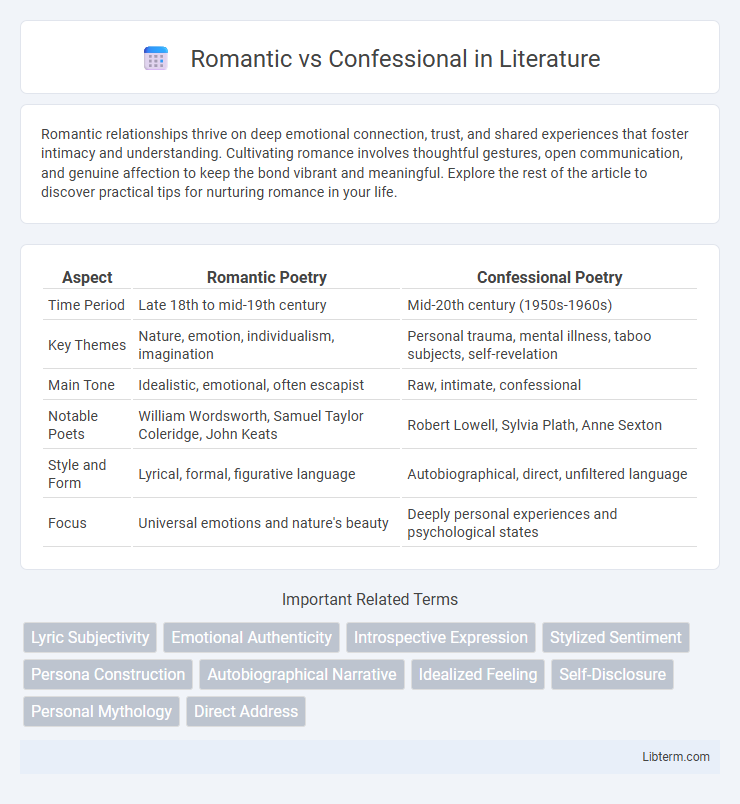Romantic relationships thrive on deep emotional connection, trust, and shared experiences that foster intimacy and understanding. Cultivating romance involves thoughtful gestures, open communication, and genuine affection to keep the bond vibrant and meaningful. Explore the rest of the article to discover practical tips for nurturing romance in your life.
Table of Comparison
| Aspect | Romantic Poetry | Confessional Poetry |
|---|---|---|
| Time Period | Late 18th to mid-19th century | Mid-20th century (1950s-1960s) |
| Key Themes | Nature, emotion, individualism, imagination | Personal trauma, mental illness, taboo subjects, self-revelation |
| Main Tone | Idealistic, emotional, often escapist | Raw, intimate, confessional |
| Notable Poets | William Wordsworth, Samuel Taylor Coleridge, John Keats | Robert Lowell, Sylvia Plath, Anne Sexton |
| Style and Form | Lyrical, formal, figurative language | Autobiographical, direct, unfiltered language |
| Focus | Universal emotions and nature's beauty | Deeply personal experiences and psychological states |
Understanding Romantic Poetry: Key Themes and Features
Romantic poetry emphasizes nature, emotion, and individualism, portraying beauty and imagination as central themes. Writers like Wordsworth and Coleridge highlight sublime experiences and personal reflection through vivid, sensory language. This genre often explores the tension between human creativity and societal constraints, fostering a deep connection with the natural world.
The Confessional Movement: Origins and Characteristics
The Confessional Movement emerged in the mid-20th century as a reaction against the idealized emotions of Romanticism, emphasizing raw, personal truth and psychological depth. Originating with poets like Robert Lowell and Sylvia Plath, it focused on autobiographical content, mental health struggles, and intimate experiences often taboo in earlier literature. The movement's hallmark is its candid, unfiltered narrative style, challenging traditional poetic conventions through confessional honesty.
Romanticism: Emotion, Nature, and the Sublime
Romanticism emphasizes the profound connection between human emotion, the natural world, and the sublime, portraying feelings as a gateway to transcendence and personal insight. Poets like William Wordsworth and Samuel Taylor Coleridge use vivid imagery and emotional intensity to express awe toward nature's beauty and its capacity to inspire spiritual awakening. This movement values imagination and individual experience, contrasting with the introspective, self-revealing approach of Confessional poetry.
Confessional Poetry: Personal Experience and Self-Exposure
Confessional poetry emphasizes personal experience and self-exposure, often revealing intimate details of the poet's life, such as trauma, mental illness, and family conflicts. Unlike the broader, nature-focused themes of Romantic poetry, confessional poets use candid, autobiographical narratives to evoke emotional honesty and psychological depth. This style, exemplified by poets like Sylvia Plath and Robert Lowell, challenges traditional poetic boundaries by prioritizing raw emotion and vulnerability.
Major Poets: Romantics vs. Confessionals
Romantic poetry, exemplified by major poets such as William Wordsworth, Samuel Taylor Coleridge, and John Keats, emphasizes nature, emotion, and individual imagination. In contrast, Confessional poets like Sylvia Plath, Robert Lowell, and Anne Sexton focus on personal experiences, psychological struggles, and raw emotional honesty. The Romantics seek transcendence and beauty, while Confessional poets delve into the complexities of self-identity and mental health.
Stylistic Differences: Language, Tone, and Structure
Romantic poetry often employs elevated, ornate language with a lyrical and idealistic tone, emphasizing nature, emotion, and individualism through structured forms like sonnets and odes. Confessional poetry, in contrast, uses colloquial, candid language with an intimate and raw tone, often reflecting personal trauma and psychological depth through free verse and fragmented structures. The stylistic differences highlight Romanticism's focus on universal themes and aesthetic beauty versus Confessionalism's introspective, unfiltered self-exploration and vulnerability.
Subject Matter: Universal Truths vs. Personal Narratives
Romantic poetry explores universal truths through idealized themes like nature, love, and heroism, reflecting collective human experiences and emotions. Confessional poetry delves into deeply personal narratives, exposing intimate aspects of the poet's own life, such as mental health struggles, familial relationships, and trauma. The contrast lies in Romanticism's emphasis on shared, timeless ideals versus Confessionalism's raw, individualized self-expression.
Impact on Literary History and Modern Poetry
Romantic poetry revolutionized literary history by emphasizing emotion, nature, and individualism, laying the foundation for modern poetic expression through its celebration of personal experience and imagination. Confessional poetry, emerging in the mid-20th century, deepened this impact by introducing raw, autobiographical content that challenged traditional poetic forms and societal taboos. This shift toward vulnerability and psychological exploration has profoundly influenced contemporary poetry, encouraging an intimate connection between poet and reader.
Critical Reception: Then and Now
Romantic poetry initially received critical acclaim for its emphasis on emotion and nature, celebrated by figures like Wordsworth and Keats for its imaginative scope and aesthetic beauty. Confessional poetry, emerging in the mid-20th century, faced mixed reviews due to its raw, personal subject matter, with poets such as Sylvia Plath and Robert Lowell challenging conventional norms. Contemporary critics now often praise confessional poetry for its psychological depth and authenticity, while Romanticism remains valued for its foundational impact on modern poetic forms and emotional expression.
Romantic vs. Confessional: Enduring Influence and Legacy
Romantic literature emphasizes individual emotion, nature, and idealism, shaping artistic expression with a timeless exploration of human passion and imagination. Confessional poetry, marked by personal trauma, mental health struggles, and candid self-revelation, revolutionized modern verse by breaking taboos and fostering authenticity in voice. The enduring influence of Romanticism lies in its celebration of beauty and sublime experience, while Confessionalism's legacy persists in its raw honesty and psychological depth that continue to inspire contemporary writers.
Romantic Infographic

 libterm.com
libterm.com